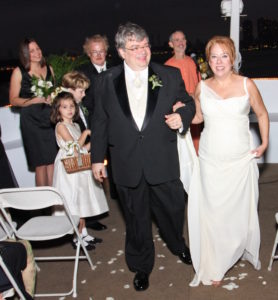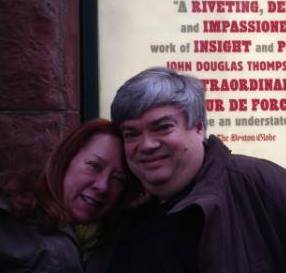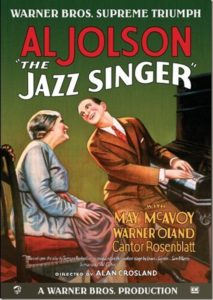 Mrs. T and I got married ten years ago today. We’d met a couple of years earlier and fallen in love at first sight—such things really do happen—and we’ve been together ever since.
Mrs. T and I got married ten years ago today. We’d met a couple of years earlier and fallen in love at first sight—such things really do happen—and we’ve been together ever since.
Our wedding took place on a chartered yacht called (I swear) the Romantica. We cruised around the island of Manhattan that night with several dozen friends and family members. I’ve never seen so many joyous-looking people in one place at one time, starting with the bride and groom, both of whom were about as delighted as it’s possible for two people to be. We still are.
I’ve had a lot to say in this space since then about my beloved wife. Our life together has been exciting, exhausting, and complicated. We’ve shared adventures of all kinds all over the country. The best ones, I think, have been on Florida’s Sanibel Island, our home away from home, but it’d be hard to single out any specific occasion as uniquely special. (O.K., maybe this one.) Yet we always return with undiminished pleasure to our art-filled apartment in New York and our scruffy little farmhouse in rural Connecticut, where we sit together on the couch night after night, watching double and triple features on TCM and talking about everything under the sun. Our tastes, aesthetic and otherwise, are largely in common, our opinions less so, which keeps the talk lively, as does Mrs. T’s naughty tendency to puncture whatever conversational balloon I may be feeling inclined to inflate. (This little vignette will give you some idea of what our evenings at home are like.)
 To marry in middle age is an adventure in and of itself. Mrs. T and I are both stubborn, settled creatures of long-established habit, and though we quickly made room for each other in our lives, it wasn’t always easy for us to get along. Yet that never seemed to matter, and still doesn’t: I know that from the night we met, I’ve never wanted to share my life with anyone else. She has opened doors in my heart and soul that I didn’t even know existed. Among many, many other things, I have no doubt whatsoever that had we not met, I wouldn’t have found it within myself to start writing for the stage. When I took my first curtain call, she was in the audience, cheering loudly and proudly. She’s been there ever since.
To marry in middle age is an adventure in and of itself. Mrs. T and I are both stubborn, settled creatures of long-established habit, and though we quickly made room for each other in our lives, it wasn’t always easy for us to get along. Yet that never seemed to matter, and still doesn’t: I know that from the night we met, I’ve never wanted to share my life with anyone else. She has opened doors in my heart and soul that I didn’t even know existed. Among many, many other things, I have no doubt whatsoever that had we not met, I wouldn’t have found it within myself to start writing for the stage. When I took my first curtain call, she was in the audience, cheering loudly and proudly. She’s been there ever since.
It is a miraculous thing to suddenly find yourself living with a smart, funny, indomitably gallant woman, an everyday miracle that is far too easily taken for granted. I know I do that sometimes, and I hate myself for it, but far more often than not, I’m intensely aware of how lucky I am to have met Mrs. T, and how much luckier I am that she was willing to settle down with me.
 When, eleven years ago, the then-future Mrs. T and I trimmed our first Christmas tree together in Connecticut, I made the following observation: “To be happy, not in memory but in the moment, is the shining star on the tree of life.” That is what I am, and she is the person to whom I owe it. Our marriage is the best thing to have happened to me in a life overflowing with good fortune. May it go on and on.
When, eleven years ago, the then-future Mrs. T and I trimmed our first Christmas tree together in Connecticut, I made the following observation: “To be happy, not in memory but in the moment, is the shining star on the tree of life.” That is what I am, and she is the person to whom I owe it. Our marriage is the best thing to have happened to me in a life overflowing with good fortune. May it go on and on.
* * *
Tony Bennett and Bill Evans perform “Lucky to Be Me,” by Leonard Bernstein, Betty Comden, and Adolph Green. This song was sung by Mary Foster Conklin at our wedding:



 Neil Simon has disappeared from Broadway, a street that he used to own. Only one of his plays, the 2005 Nathan Lane-Matthew Broderick revival of “The Odd Couple,” has had a successful run there in the past decade and a half. For this reason, I’ve spent the past few seasons seeking out regional revivals of Mr. Simon’s plays in an attempt to learn how they’re holding up now that fashions in comedy have changed. That’s what brought me to Vermont last week to see “Broadway Bound,” whose David Cromer-directed 2009 Broadway revival was canceled due to lack of interest—and you know what? It turns out to be a very strong piece of work, one of the most impressive of the more-or-less autobiographical plays in which Mr. Simon portrayed the splendors and miseries of his youth with a potent blend of harsh candor and honest sentiment.
Neil Simon has disappeared from Broadway, a street that he used to own. Only one of his plays, the 2005 Nathan Lane-Matthew Broderick revival of “The Odd Couple,” has had a successful run there in the past decade and a half. For this reason, I’ve spent the past few seasons seeking out regional revivals of Mr. Simon’s plays in an attempt to learn how they’re holding up now that fashions in comedy have changed. That’s what brought me to Vermont last week to see “Broadway Bound,” whose David Cromer-directed 2009 Broadway revival was canceled due to lack of interest—and you know what? It turns out to be a very strong piece of work, one of the most impressive of the more-or-less autobiographical plays in which Mr. Simon portrayed the splendors and miseries of his youth with a potent blend of harsh candor and honest sentiment. Classic Stage Company, one of New York’s most admired off-Broadway theaters, has launched its fiftieth season with an “As You Like It” directed by John Doyle, who become CSC’s artistic director last year. Mr. Doyle, who specializes in spare small-scale stagings of musicals, hasn’t done much Shakespeare, and this production, a 100-minute-long minimalist version of Shakespeare’s comedy, is very much in the now-familiar style of his CSC revivals of Stephen Sondheim’s “Pacific Overtures” and “Passion.” The set, which he designed himself, is as close to a bare stage as you can get, and the actors, as is also Mr. Doyle’s wont, supply their own instrumental accompaniment for the agreeable Broadway-style songs, set to Shakespeare’s words by Stephen Schwartz, with which the show is sprinkled.
Classic Stage Company, one of New York’s most admired off-Broadway theaters, has launched its fiftieth season with an “As You Like It” directed by John Doyle, who become CSC’s artistic director last year. Mr. Doyle, who specializes in spare small-scale stagings of musicals, hasn’t done much Shakespeare, and this production, a 100-minute-long minimalist version of Shakespeare’s comedy, is very much in the now-familiar style of his CSC revivals of Stephen Sondheim’s “Pacific Overtures” and “Passion.” The set, which he designed himself, is as close to a bare stage as you can get, and the actors, as is also Mr. Doyle’s wont, supply their own instrumental accompaniment for the agreeable Broadway-style songs, set to Shakespeare’s words by Stephen Schwartz, with which the show is sprinkled. On Thursday [Weinstein] gave an interview to the Los Angeles Times that will live long in the annals of arrogance. Not only does Mr. Weinstein believe that Mr. Polanski should be set free at once, but he claims that “Hollywood has the best moral compass, because it has compassion. We were the people who did the fundraising telethon for the victims of 9/11. We were there for the victims of Katrina and any world catastrophe.” That’s the voice of a man who spends his days listening to toadies—and who knows nothing of the deeply felt beliefs of the ordinary people who pay their hard-earned money to see his pictures. I wonder how many of them will henceforth be inclined to steer by the compass of anyone who thinks that rape is a “so-called crime.”
On Thursday [Weinstein] gave an interview to the Los Angeles Times that will live long in the annals of arrogance. Not only does Mr. Weinstein believe that Mr. Polanski should be set free at once, but he claims that “Hollywood has the best moral compass, because it has compassion. We were the people who did the fundraising telethon for the victims of 9/11. We were there for the victims of Katrina and any world catastrophe.” That’s the voice of a man who spends his days listening to toadies—and who knows nothing of the deeply felt beliefs of the ordinary people who pay their hard-earned money to see his pictures. I wonder how many of them will henceforth be inclined to steer by the compass of anyone who thinks that rape is a “so-called crime.” Writing a few weeks after its release, Robert E. Sherwood, a movie critic who later became one of America’s top playwrights, found it to be “fraught with tremendous significance,” but not for its artistry. “I for one suddenly realized that the end of the silent drama is in sight,” he wrote. Sherwood may have been the first writer to fully grasp the culture-changing power of “The Jazz Singer”: Not only did it introduce a new storytelling medium, but it killed off an old one.
Writing a few weeks after its release, Robert E. Sherwood, a movie critic who later became one of America’s top playwrights, found it to be “fraught with tremendous significance,” but not for its artistry. “I for one suddenly realized that the end of the silent drama is in sight,” he wrote. Sherwood may have been the first writer to fully grasp the culture-changing power of “The Jazz Singer”: Not only did it introduce a new storytelling medium, but it killed off an old one.